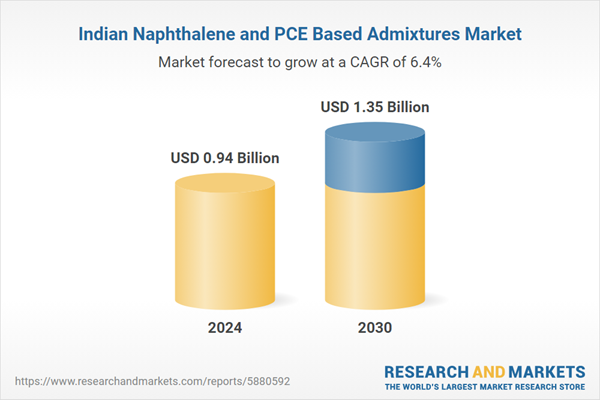Speak directly to the analyst to clarify any post sales queries you may have.
10% Free customizationThis report comes with 10% free customization, enabling you to add data that meets your specific business needs.
These admixtures support the construction of resilient infrastructure, especially in high-load urban environments. As India’s construction sector - employing over 32 million people - continues to expand rapidly, the adoption of these admixtures is being driven by a growing focus on sustainable practices, enhanced workability, and reduced environmental impact. Additionally, the emergence of ready-mix concrete and increasing government investments in infrastructure are further accelerating market demand.
Key Market Drivers
The market for naphthalene and PCE-based admixtures is being driven by rapid urbanization and infrastructure development.India’s swift urban growth is leading to increased demand for durable, high-performance building materials. With the urban population expected to reach 600 million by 2036, infrastructure projects in transport, energy, and public sanitation are gaining momentum. Naphthalene and PCE-based admixtures are vital in addressing these demands by improving the performance of concrete - enhancing strength, reducing water content, and ensuring longevity under harsh environmental conditions. Their use is particularly beneficial in constructing high-rise buildings, bridges, and infrastructure subject to extreme stress or weather. These admixtures also support sustainable construction goals by minimizing cement and water use, reducing environmental impact. Furthermore, their ability to increase resistance to chemical exposure, freeze-thaw cycles, and abrasion makes them ideal for disaster-resilient structures, thereby extending infrastructure lifespan and lowering maintenance costs.
Key Market Challenges
Quality Control and Standardization
The Indian naphthalene and PCE-based admixtures market faces key hurdles due to the absence of uniform standards and testing protocols. Without a consistent regulatory framework, comparing product quality and performance across manufacturers becomes difficult. Varying regional construction codes and fragmented regulatory oversight add further complexity for manufacturers seeking nationwide compliance. Additionally, limited industry awareness of the benefits of admixtures hampers market penetration, especially among small-scale builders and in semi-urban areas. The lack of standardized quality assurance processes also increases the risk of substandard products entering the market, potentially compromising project safety and durability. Establishing clear national guidelines for admixture use and performance evaluation is essential for market growth and product reliability.Key Market Trends
Rising Demand for Ready-Mix Concrete
The growing preference for ready-mix concrete (RMC) is a significant trend influencing demand for naphthalene and PCE-based admixtures. These admixtures enhance RMC performance by improving strength, reducing water usage, and ensuring consistency in large-scale projects. With India focusing on green building standards such as LEED and GRIHA, the demand for environmentally friendly admixtures is also rising. Additionally, the push for high-performance concrete (HPC) in infrastructure projects - such as highways, metros, and airports - is further boosting the use of these admixtures due to their superior durability and performance characteristics. As urban development intensifies, especially in smart city projects, the integration of high-quality admixtures into concrete mixes is becoming standard practice for long-term sustainability and efficiency.Key Market Players
- BASF SE
- Sika AG
- Himadri Speciality Chemical Limited
- CBS Chemicals
- W. R. Grace & Company
- B&B Specialities (India) Pvt Ltd.
- Yahska Polymers Pvt Ltd.
Report Scope:
In this report, the India Naphthalene and PCE Based Admixtures Market has been segmented into the following categories, in addition to the industry trends which have also been detailed below:India Naphthalene and PCE Based Admixtures, By Type:
- Polycarboxylate Ether
- Sulphonated Naphthalene Formaldehyde (SNF)
- Sulphonated Melamine Formaldehyde (SMF)
India Naphthalene and PCE Based Admixtures, By Application:
- Naphthalenesulfonic Acids
- Phthalic Anhydride
- Laboratory Uses
India Naphthalene and PCE Based Admixtures, By Region:
- North India
- South India
- West India
- East India
Competitive Landscape
Company Profiles: Detailed analysis of the major companies present in the India Naphthalene and PCE Based Admixtures Market.Available Customizations:
With the given market data, the publisher offers customizations according to a company's specific needs. The following customization options are available for the report.Company Information
- Detailed analysis and profiling of additional market players (up to five).
This product will be delivered within 1-3 business days.
Table of Contents
Companies Mentioned
- BASF SE
- Sika AG
- Himadri Speciality Chemical Limited
- CBS Chemicals
- W. R. Grace & Company
- B&B Specialities (India) Pvt Ltd
- Yahska Polymers Pvt Ltd
Table Information
| Report Attribute | Details |
|---|---|
| No. of Pages | 80 |
| Published | July 2025 |
| Forecast Period | 2024 - 2030 |
| Estimated Market Value ( USD | $ 0.94 Billion |
| Forecasted Market Value ( USD | $ 1.35 Billion |
| Compound Annual Growth Rate | 6.4% |
| Regions Covered | India |
| No. of Companies Mentioned | 7 |









